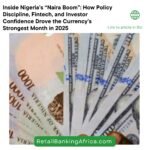The Governor of the Central Bank of Nigeria (CBN), Olayemi Cardoso, has reaffirmed the apex bank’s commitment to maintaining monetary stability, emphasizing the importance of strict policy measures and proactive oversight. Speaking at the 2025 Monetary Policy Forum, themed “Managing the Disinflation Process,” Cardoso outlined Nigeria’s economic challenges, recent policy successes, and the outlook for 2025.
Navigating Inflation and Exchange Rate Challenges
Nigeria’s inflationary environment remains a major concern, shaped by global economic shocks, local structural constraints, and liquidity pressures. Despite these hurdles, measurable progress has been made:
• Foreign exchange rate disparities have narrowed, bringing more stability to the market.
• Nigeria’s foreign reserves have surpassed $40 billion, marking their highest level in three years.
• Inflation remains high, but recent policy interventions are aimed at driving a gradual decline.
“Achieving monetary stability requires sustained vigilance and a proactive policy stance. We will continue to tighten our oversight to ensure a more stable economic environment,” Cardoso assured.
However, he cautioned that structural weaknesses, exchange rate volatility, and rising energy prices continue to exert pressure on inflation and economic activities.
Excess Liquidity and the CBN’s Response
One of the key drivers of inflation, according to Cardoso, is excess liquidity in the financial system, largely due to expansionary policies implemented since the COVID-19 pandemic. While these policies were designed to cushion economic shocks, they did not translate into sustainable productivity growth. Instead, they worsened inflationary pressures and contributed to foreign exchange instability.
“Excess naira liquidity has fueled demand-driven inflation, further compounded by supply-side challenges. Addressing this requires monetary discipline and a well-coordinated policy approach,” Cardoso explained.
In response, the CBN has adopted a tightening cycle, deploying conventional monetary tools, including adjustments to the Monetary Policy Rate (MPR), to curb inflation and stabilize the economy.
Economic Outlook for 2025: A Strategic Approach
Looking ahead, Cardoso expressed confidence that Nigeria is making steady progress towards economic stability and disinflation. However, he stressed the need for bold, consistent policy decisions to build on recent successes.
“We are at a turning point. While challenges remain, we are optimistic that disinflation is within reach, provided we stay committed to strategic policy implementation,” he stated.
Strengthening the Banking Sector: New Capital Requirements
As part of broader financial sector reforms, the CBN has introduced a new minimum capital requirement for banks, set to take effect in March 2026. The goal is to:
• Improve the resilience of Nigeria’s banking sector against economic shocks.
• Enhance global competitiveness, ensuring Nigerian banks can support broader economic growth.
• Position the financial system to support the government’s $1 trillion economy ambition.
“A strong and well-capitalized banking sector is critical for economic stability. This policy will ensure Nigerian banks are better positioned to support long-term growth,” Cardoso noted.
Maintaining Vigilance for a Stable Future
Cardoso reaffirmed that the CBN will continue to closely monitor economic indicators, making necessary adjustments to keep inflation under control and ensure overall financial stability.
With a tightening monetary stance, strengthened banking regulations, and a strategic focus on sustainable growth, Nigeria is on the path to a more stable and resilient economy in 2025 and beyond.










